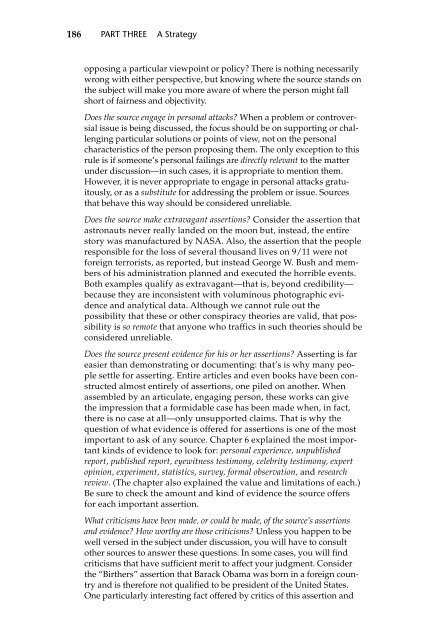Beyond Feelings
Beyond Feelings
Beyond Feelings
You also want an ePaper? Increase the reach of your titles
YUMPU automatically turns print PDFs into web optimized ePapers that Google loves.
186 PART THREE A Strategy<br />
opposing a particular viewpoint or policy? There is nothing necessarily<br />
wrong with either perspective, but knowing where the source stands on<br />
the subject will make you more aware of where the person might fall<br />
short of fairness and objectivity.<br />
Does the source engage in personal attacks? When a problem or controversial<br />
issue is being discussed, the focus should be on supporting or challenging<br />
particular solutions or points of view, not on the personal<br />
characteristics of the person proposing them. The only exception to this<br />
rule is if someone’s personal failings are directly relevant to the matter<br />
under discussion—in such cases, it is appropriate to mention them.<br />
However, it is never appropriate to engage in personal attacks gratuitously,<br />
or as a substitute for addressing the problem or issue. Sources<br />
that behave this way should be considered unreliable.<br />
Does the source make extravagant assertions? Consider the assertion that<br />
astronauts never really landed on the moon but, instead, the entire<br />
story was manufactured by NASA. Also, the assertion that the people<br />
responsible for the loss of several thousand lives on 9/11 were not<br />
foreign terrorists, as reported, but instead George W. Bush and members<br />
of his administration planned and executed the horrible events.<br />
Both examples qualify as extravagant—that is, beyond credibility—<br />
because they are inconsistent with voluminous photographic evidence<br />
and analytical data. Although we cannot rule out the<br />
possibility that these or other conspiracy theories are valid, that possibility<br />
is so remote that anyone who traffics in such theories should be<br />
considered unreliable.<br />
Does the source present evidence for his or her assertions? Asserting is far<br />
easier than demonstrating or documenting: that’s is why many people<br />
settle for asserting. Entire articles and even books have been constructed<br />
almost entirely of assertions, one piled on another. When<br />
assembled by an articulate, engaging person, these works can give<br />
the impression that a formidable case has been made when, in fact,<br />
there is no case at all—only unsupported claims. That is why the<br />
question of what evidence is offered for assertions is one of the most<br />
important to ask of any source. Chapter 6 explained the most important<br />
kinds of evidence to look for: personal experience, unpublished<br />
report, published report, eyewitness testimony, celebrity testimony, expert<br />
opinion, experiment, statistics, survey, formal observation, and research<br />
review. (The chapter also explained the value and limitations of each.)<br />
Be sure to check the amount and kind of evidence the source offers<br />
for each important assertion.<br />
What criticisms have been made, or could be made, of the source’s assertions<br />
and evidence? How worthy are those criticisms? Unless you happen to be<br />
well versed in the subject under discussion, you will have to consult<br />
other sources to answer these questions. In some cases, you will find<br />
criticisms that have sufficient merit to affect your judgment. Consider<br />
the “Birthers” assertion that Barack Obama was born in a foreign country<br />
and is therefore not qualified to be president of the United States.<br />
One particularly interesting fact offered by critics of this assertion and


